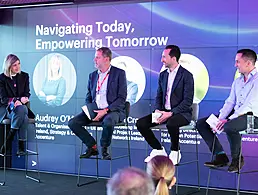Maria Sweeney began a new job just two weeks before the pandemic forced people across the country to work from home. Here, she shares her experience of learning the ropes remotely.
Due to the sudden shift to remote working during the pandemic, many people have been tasked with starting a new job from home. Maria Sweeney was one of them. Having sold her dog-grooming business at the end of 2019, she joined Dublin recruitment firm Spirit Executive earlier this year.
However, Sweeney started her new job just two weeks before nationwide restrictions came in to limit the spread of Covid-19, and only managed to get two weeks at the office under her belt before workers across Ireland were told to stay at home.
“Obviously none of us knew what was going on – not just in Spirit, but in the country as a whole,” she says. “Nobody knew what was going on with the jobs market and what effect it was going to have.”
A team of three people – Sweeney, her boss and her colleague – had to adjust their client-facing and communication-heavy roles to the remote world.
“And obviously, then everybody adapted to working from home and they found that they were able to keep going as much as they had been in the office,” she explains. “And for me, it was just a total baptism by fire.”
A manager’s support is key
So, what helped Sweeney settle into her new job remotely? She describes how valuable it was to have a “hotline” with her boss. He told her to call or text him any time she had a question.
“What you really miss is swinging around and turning to someone to ask, ‘What do you do for this?’ But you also don’t want to necessarily pick up the phone every time, either.”
To get around that, the team set up a WhatsApp group in which they could talk to each other throughout the day. Each day, Sweeney would create a list of questions she wanted to ask her boss during a catch-up and they would use screensharing on video calls to discuss the projects they were working on.
Alongside her day-to-day duties, she had a number of new tools to contend with. One she has found useful so far is the recruiter part of LinkedIn, though she had never engaged with it before joining Spirit. She’s been doing remote training sessions and webinars with her manager to bring her up to speed.
Image: Maria Sweeney
Upskilling at home
Like many others, Sweeney has also taken this time to learn some new skills. When she entered the world of recruitment, she saw a gap in the market for people with the ability to hire for niche technical roles, such as software developers.
“Very few recruiters specialise in tech,” she says. “We can’t speak the language the developers do. And those kinds of people who are going for the software jobs, the coding jobs, they don’t want to talk to people who don’t have a clue about what they do; who don’t have a clue about the difference between Java or Python.”
For that reason, Sweeney turned to the Code Institute for a free five-day course that introduced her to the subject, and she spent one hour each day on it. But after the introductory course, she knew that a year-long foray into coding wasn’t going to be for her.
“I don’t want to be the person that writes the apps or goes into the companies as these developers. But I want to know enough to be able to talk to these people, to match them with the right companies or get the companies who are looking to hire these people to know where to source them and how to actually talk to them.
“And so I decided to do the diploma in coding fundamentals. It’s an overview of the different languages and it’s designed for people who are perhaps business leaders or product managers who need to understand the role without actually knowing the full coding languages.
“It just gives us a better way to actually communicate and have meaningful conversations with developers, with companies who are looking to hire developers and with developers who are looking to move from one company to the next.”
‘I think when you’re working from home, it’s easy to become quite insular’
– MARIA SWEENEY
If you want to do some upskilling of your own but don’t know where to start, Sweeney recommends taking an aptitude test. She took the Red Bull Wingfinder, which was developed with psychologists from University College London.
“It’s basically a really comprehensive assessment of your soft skills,” she says. “It’ll evaluate you in areas of spatial awareness, communication skills and various other things.”
Other popular aptitude tests include CareerExplorer, CareerFitter, Self-Directed Search and the MBTI test by the Myers & Brigg Foundation.
Treading the fine line between personal and professional
One of the biggest lessons Sweeney has learned while settling in remotely is that it’s easy to become “insular” when you start a new job from home.
“You’re constantly switched on,” she says. “And for the first few months, because I was new to the company and it was a learning curve for me, I was very much on my phone and on my laptop all day, every day.
“We couldn’t go anywhere and there was nothing to do. So I had that time to be able to just do loads of reading and researching, attend online courses. And I found that was the best way to kind of immerse myself in it.”
She had to remind herself, however, that despite being new to the job and wanting to prove herself, it was still important to set boundaries. “I think when you’re working from home, it’s easy to become quite insular. People can very easily fall into the trap of anxiety, nearly being afraid to pick up the phone because it’s kind of like an invasion of your home for some people.
“There’s no clear line between people’s personal lives and professional lives in a lot of cases. I think rather than let myself slip into that mindset, I was determined to just push through it and keep talking to people, keep engaging with people.
“But there’s also a real fine line between your own mental health and understanding that your boss or colleagues may have other things going on. And while your priority might be the be-all and end-all for you on that day, it’s not necessarily theirs. And you have to understand that.”




